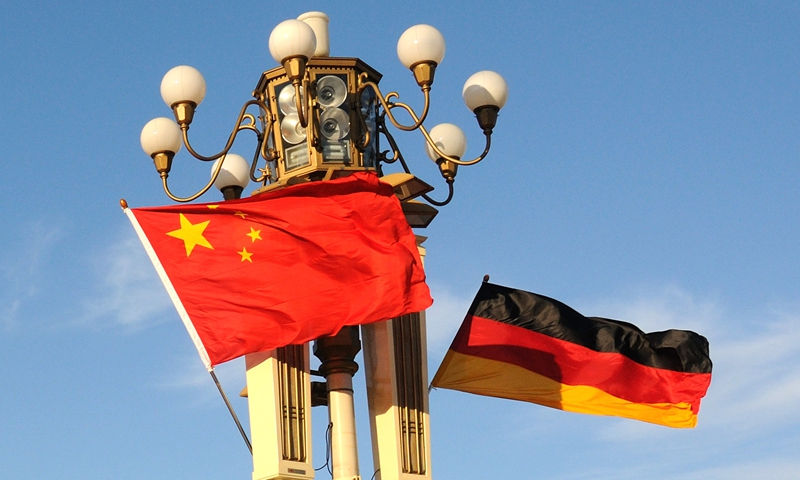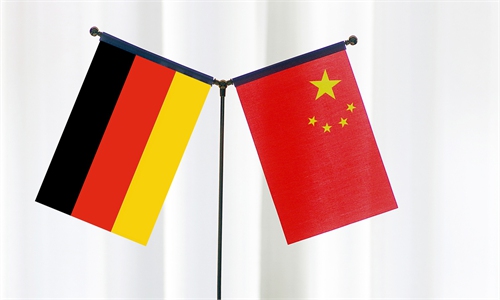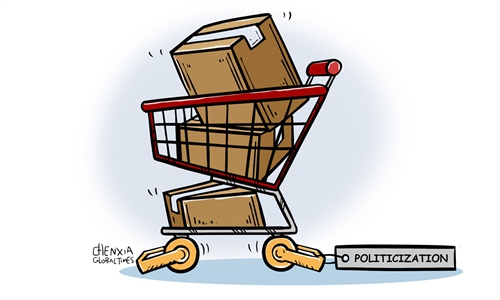
China Germany: Xinhua
During German Chancellor Olaf Scholz's closely watched trip to China on Friday, China and Germany discussed a wide range of topics, including bilateral economic and trade cooperation and global issues of shared interest. While much of the discussions were more or less usual during such official visits, one specific topic could have profound implications for relations among China, Germany, Europe and the US for months and years to come: Chinese and German leaders unequivocally rejected the US' push for decoupling from China, which had been gaining traction in some European political circles.
During Scholz's one-day visit in Beijing, the two sides repeatedly stated that they are against economic decoupling. The German Chancellor for his part did not mince words when voicing opposition to calls for a decoupling from China. "Germany firmly supports trade liberalization, supports economic globalization and opposes decoupling," Scholz stressed during a meeting, according to an official readout. He had also repeatedly voiced opposition to decoupling even before he embarked on the trip.
For anyone who is familiar with the rise of the "decoupling" rhetoric in the West, it should be very straightforward that this is the latest attempt in Washington's containment strategy against China. After a tariff war and an ever-expanding economic crackdown campaign against China over the years failed to rein in China's rise, the US government, under President Joe Biden, has shifted focus toward roping in more US allies to join its containment strategy by warning about the West's economic dependence on China and advocating for decoupling. After the start of the Russia-Ukraine conflict and the sweeping economic sanctions that followed it, many politicians in Europe have simply adopted Washington's talking points about decoupling from China to reduce dependency on China. So when the German Chancellor declared opposing decoupling during his trip to China, it is a clear rejection of Washington's sinister campaign.
Scholz actually went beyond simply denouncing the US' attempt. He further said that Germany stands ready for closer trade and economic cooperation with China, and supports more mutual investment between Chinese and German businesses. On issues where the two countries' positions diverge, Germany is willing to exchange views with China to increase mutual understanding and trust. A multi-polar world is needed in which the role and influence of emerging countries can be taken seriously, he said. This too is also a clear rebuttal to the US' attempt to drive a wedge between China, Germany and Europe to ultimately preserve its hegemony - or a unipolar world with the US at the front and center.
The German Chancellor did not stop there. He also stated that Germany opposes bloc confrontation for which politicians should be held responsible and that Germany will play its role in furthering Europe-China relations. This is profoundly significant. Such remarks are the strongest rejection yet from a Western leader of the US' attempt to draw an ideological line between major powers, instigate confrontation among them and ultimately eliminate any formidable challenger to its decades-long dominance, which is rapidly shrinking, not just because of the rise of other countries, but also because of the endless string of internal political, social and economic crises in the US.
Clearly, such remarks from Scholz during his trip were not only meant to reassure his hosts but were also aimed at an audience back in Europe and the US, because the German Chancellor was fully aware of the attention and criticism his trip has drawn. Given all this, it is clear that by visiting China, Scholz was not only aiming to boost China-Germany bilateral economic and trade ties, but was actually aiming to highlighting the need for a course correction in Europe when it comes to issues related to the continent's own interests, particularly how it should handle relations with China amid intensifying pressure from Washington. In this sense, what Washington and its staunch followers in Europe feared the most about Scholz's trip may have just became reality -an unequivocal rejection of their push for decoupling from China and bloc confrontation along ideological lines.
Now one might ask: "Ok, Scholz made these remarks, so what? That won't change the US' attempts to advocate decoupling and bloc confrontation to contain China and preserve its hegemony. To an extent, that's true. One trip and words of reason will certainly not change Washington's malicious attempts. The significance of Scholz's trip and his remarks is that European leaders are increasingly realizing that they are on a dangerous path due in large part to the US' intervention and instigation and it appears they are at least starting to address the problem head on. This goes a long way in terms of offering much-needed assurance to partners and clear guidance for businesses. It also deals a major setback for Washington's ill-intended attempts that would plunge the world into further turmoil.
But this is and should be just the start of a serious policy shift in Germany and Europe. Scholz's visit and his remarks have offered much reassurance but his actions going forward - in terms of boosting business ties with China, opposing decoupling and bloc confrontation and furthering China-Europe relations - will speak louder. There are many issues Scholz can focus on in order to put his words into concrete actions. One of such issues is to treat fairly all Chinese businesses in Germany and in the broader EU market by allowing them to continue and expand their legal operations without political interference.
There is an even more opportune issue Scholz and other European leaders could focus on - the China-EU Comprehensive Agreement on Investment (CAI). The sweeping agreement was the result of strenuous negotiations between the two sides and is enormously beneficial for both countries, particularly at such a time of geopolitical and economic turbulence. The CAI has been stuck in the European Parliament for over a year now because of nothing but politics and US-instigated opposition. If Germany is indeed opposed to decoupling and seeks closer economic cooperation with China, what's more effective than restarting the process of approving and implementing the CAI?
The author is an editor with the Global Times. bizopinion@globaltimes.com.cn




